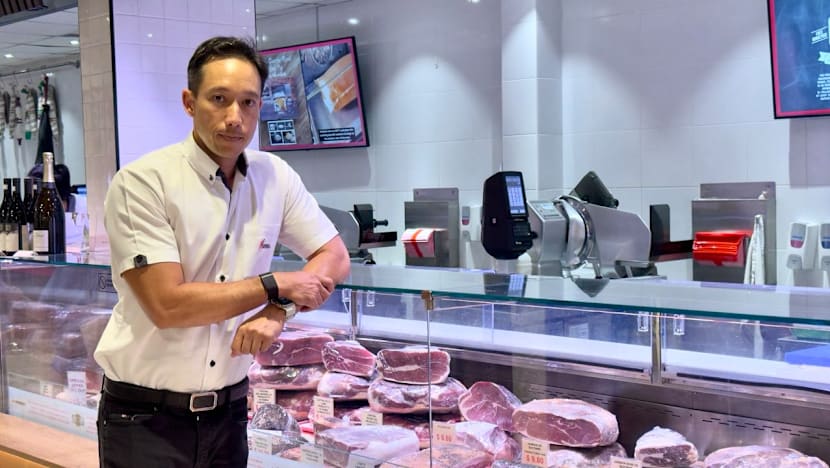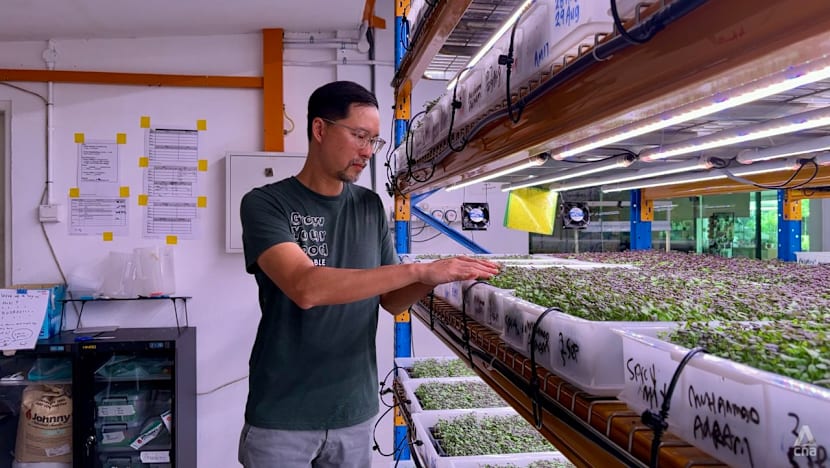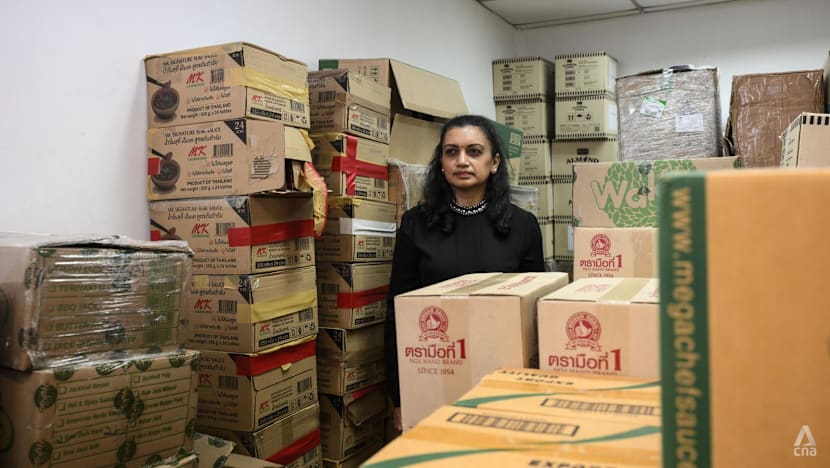Singapore food suppliers face late payments, falling revenues as more restaurants close
Suppliers say customers are stretching payment terms from 30 days to as long as four months, putting their cash flow under strain.

Suppliers in Singapore are facing challenges as food service businesses struggle. (Photos: Huber's, CNA/Lim Li Ting)

This audio is generated by an AI tool.
SINGAPORE: When clients become friends, chasing them to pay for their orders can be awkward. But with more delayed payments as food and beverage businesses struggle to stay afloat, suppliers say they have little choice.
“Everybody is suffering … no one is spared. Even the giants are taking a longer time to pay us,” said Mr Ken Tan, second-generation co-owner of Dessert Guru, which sells purees, syrups and bubble tea toppings to other businesses.
Customers who were supposed to settle their bills within 30 days are now taking up to 120, he said, adding that late payments became more frequent starting in late 2023.
Late payments affect liquidity as Dessert Guru pays its own suppliers in cash when goods are delivered or within a month.
“We are paying upfront … only for them to pay us back in three to four months, so it’s a bit painful for us,” he said.
AN INDUSTRY UNDER PRESSURE
The F&B sector has been a weak spot in Singapore's economy. The Monetary Authority of Singapore noted in July that the industry's sales have been in broad decline for three years, while the Ministry of Trade and Industry said in August it expects lacklustre growth for the sector as locals spend more abroad.
Over 3,000 F&B establishments in Singapore closed in 2024, the highest in almost two decades. High-profile casualties this year – including the closure of Prive Group's restaurants and several Haidilao outlets – have underscored the industry's troubles.
Faced with mounting risks, suppliers are tightening credit lines and enforcing payment terms.
“It's just becoming more and more important to … really strictly enforce it,” said Ms Natasha Chiam, founder of The Ice Cream and Cookie Co.
She recalled how long-standing clients sometimes promised to pay later or asked for flexibility. “You know the chef and you’re like, we’ve been working together for eight years, what can go wrong? But it can go wrong.”
Her policy now when clients miss a deadline? No payment, no delivery.


Huber’s, a local butchery and bistro, has also been stricter with payment terms, especially with new customers.
“They need to really show us a very nice, long track record,” said executive director Andre Huber, who once lost about S$70,000 (US$55,000) to clients who vanished without paying.
“I've met customers who promise me face to face, eye to eye – definitely, I’ll pay. Next thing you know, disappear, migrate to Australia, things like that,” he said. “They will lie, they will have all kinds of excuses.”
SMALL CLAIMS, DEBT COLLECTORS
Suppliers have turned to the Small Claims Tribunal, but recovering money can be difficult if firms fold.
“Whether you get the money back or not depends on whether the company has assets to sell, whether the company’s wound up, whether the people have just decided to leave Singapore,” said Ms Chiam.
Most of the time, she has been able to collect payment, but said suppliers need to act fast and make the claim before the company is completely shut down and there is nothing left.
It can cost a lot to enforce the court order and seize a client's assets, added Mr Huber.
Some have turned to legal debt collectors. Mr Huber said his company has used such services, where the debt collector pays a percentage of the amount owed and takes on the responsibility of chasing the client for money.
But there are cases that debt collectors do not want to take on because they are not confident of getting money back from the client.

Dessert Guru's Mr Tan said debt collectors are a last resort "because that would mean losing these 10-year, 15-year partnerships".
The company uses “white-collar” collectors who can affect credit scores, a tactic that usually works as customers are afraid it will affect their ability to obtain loans in future.
Cash on delivery may become more common, said Mr Royston Chew of Lam Kee Fisheries, while “good pay masters” may be courted with better pricing and credit terms.
“We are all trying to find customers that will not suddenly (close down),” he added.
SHRINKING ORDERS
Even when customers do pay, they are ordering less. Suppliers estimated that their revenues have dropped by around 20 per cent this year.
Mr Huber said that 40 to 50 of the 1,000 businesses the company serves have closed down this year. He believes more closures are looming, with many restaurants telling him their sales have dropped up to 50 per cent.
“They still remain open, but for how long more can they sustain this decrease in business?” he asked. “I really do not see where the light at the end of the tunnel is.”
His customer base of mid- to high-end restaurants seems to be harder hit. “I have a lot of chefs coming to me and asking me if I have more affordable types of meats … because what they want to do is lower the price of their menu and their dishes to try and attract people to come.”
For Mr Bjorn Low, chief urban farmer at Edible Garden City, this has meant some clients are dropping high-cost items like microgreens and edible flowers, denting his revenue.
“They will omit high-cost items on (each) plate, which is a reaction, I think, to the falling demand for people wanting to eat out,” he said.

“The market segment that we serve is niche and very finite … the pie is only that big, and the pie is getting smaller because restaurants are closing,” he said.
Ms Koshela V of Alkemal Foods said restaurants are revamping their menus more often. She works with them to create these menus and provide the products needed, so when the menu is dropped after a few months, it is a bit of “wasted effort”.
“As a consumer myself, I would assume that it’s because they need to keep things fresh … to still retain the same clientele.”
Her company distributes spices, ready-to-eat meals, sauces and more. When restaurants close down, it sometimes leaves her with excess stock.


MORE THAN JUST NUMBERS
Beyond balance sheets, suppliers lamented the erosion of Singapore’s food heritage as small, local businesses close.
“Overseas investors may have more bargaining power … this will just cause the loss of local F&B establishments,” said Mr Chew of Lam Kee Fisheries.
Singapore is known as a food haven, not a country of “uniform food”, he added.
The Ice Cream & Cookie Co's Ms Chiam said heritage businesses provide local flavour and culture. “Once you lose that ecosystem, it’s very, very, very hard to get back.”
Independent shops are more vulnerable while bigger F&B chains have the capacity to withstand troughs, said Mr Low, the microgreens supplier.
“It will just be very gentrified … with no local flavour, local innovation and creativity. I find that really sad,” he said, adding that Singapore will lose its appeal as a food destination.
Locals with great ideas may also be wary of starting something, and those who have been burned once will be less likely to re-enter. “That kills the entire scene.”

















